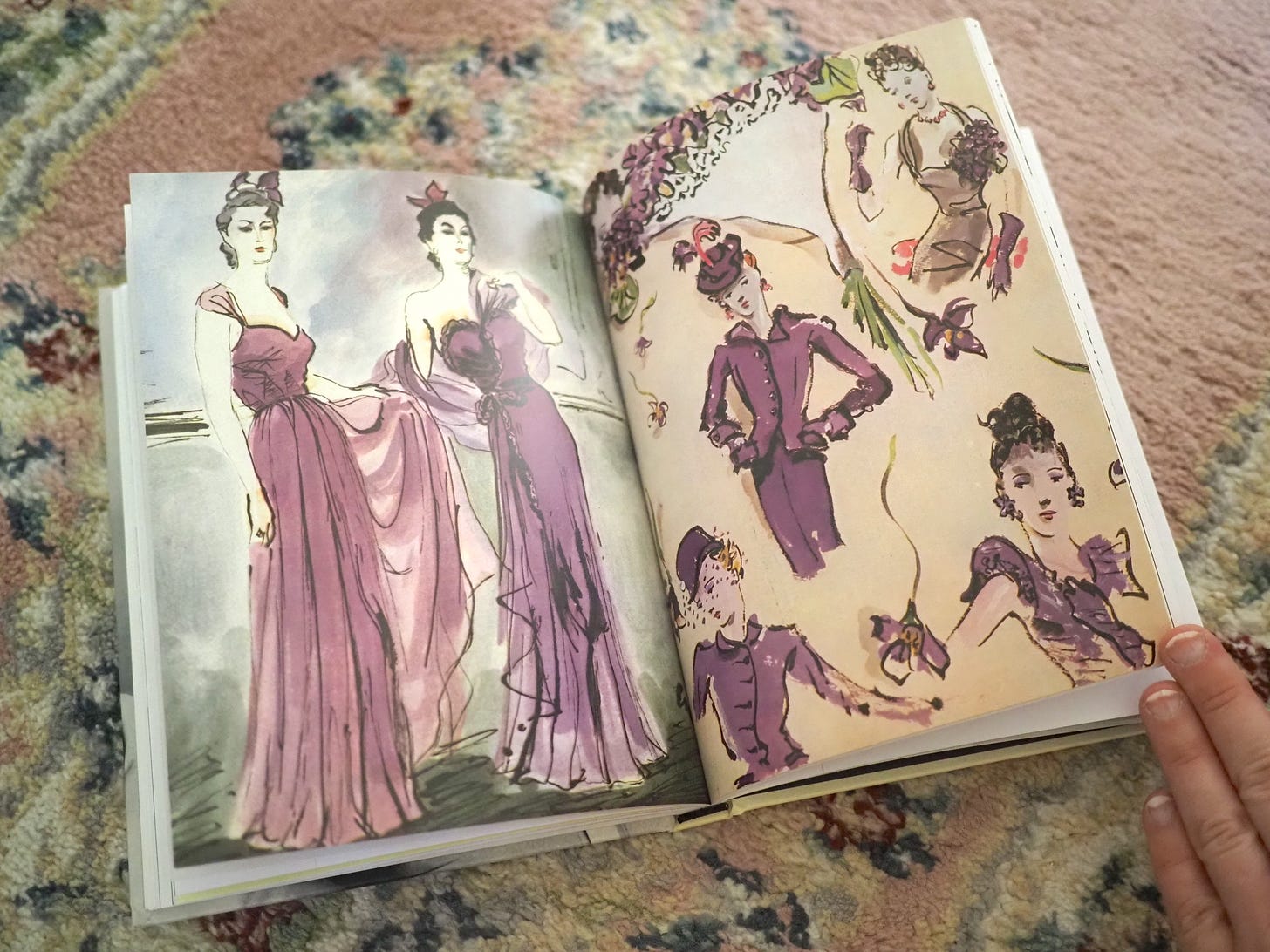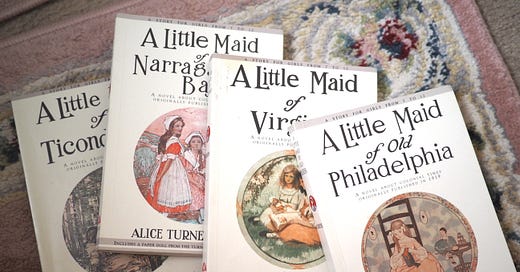Sometimes, when you read a book, there are passages that stand out to you and encapsulate, more or less, what you love about the narrative. But other times, when reading, you’re just left with a general pleasant impression and no concrete quotations.
My recent reads from the month of May have fallen squarely into one category or the other, which is why I have some longish lines from the two classics that I finished this month and nothing in particular from the other books you might have heard me mention in my May Reading Vlog. 😆
Admittedly I did not get to quite as many books as I had hoped this past month, but I am proud to say that already finished one of the ten tomes on my summer reading list that I shared in the livestream with Kate, Ann, and Christy over on Kate’s channel. We had such a blast, and I got so much inspiration from their TBR picks! But before we get to the summer, let’s take a look back at some reading highlights from May…

Pilgrim’s Progress by John Bunyan
I began my audiobook pilgrimage through this oft-quoted classic back in March and finally finished both parts one and two (I didn’t even realize there were two parts when I started!) in May. Listening to the story helped to draw me in, and I liked it so much that I’m now hoping to find a physical copy to add to my collection. Since it was originally published in 1678/1684, I’m wondering how difficult it might be to find a not-too-ratty, not-too-pricy antique version (a girl can dream, lol). The oldest books in my collection currently are some Cowper volumes from 1824, but it would be fun to have a volume from even earlier.
In the video, I talked about the doubting castle scenes which I found to be very powerful, but I also loved Christian’s conversations with his companions about their experiences and encounters along the way. In this passage, one of these characters has run into another character named Shame:
“Yes, I met with Shame; but, of all the men that I met with in my pilgrimage, he I think, bears the wrong name. The others would take "No" for an answer, at least after some words of denial; but this bold-faced Shame would never have done.”
“Why, what did he say to you?”
“What? why, he objected against religion itself…He said that a tender conscience was an unmanly thing; and that for a man to watch over his words and ways, so as to tie up himself from that liberty that the brave spirits of the times accustom themselves unto, would make him the ridicule of all the people in our time. He objected also, that but a few of the mighty, rich, or wise were ever of my opinion…He said also that religion made a man grow strange to the great, because of a few vices (which he called by finer names), and because religion made him own and respect the base, who were of the same religious company; "and is not this," said he, "a shame?””
“And what did you say to him?”
“Say? I could not tell what to say at first…But at last I began to consider that that which is highly esteemed among men is had in abomination with God. And I thought again, This Shame tells me what men are, but it tells me nothing what God, or the Word of God is. And I thought, moreover, that at the day of doom we shall not be doomed to death or life according to the spirits of the world, but according to the wisdom and law of the Highest. Therefore, thought I, what God says is best—is best, though all the men in the world are against it. Seeing, then, that God prefers His religion; seeing God prefers a tender conscience; seeing they that make themselves fools for the kingdom of heaven are wisest, and that the poor man that loveth Christ is richer than the greatest man in the world that hates Him; Shame, depart!”
I don’t want to give away any spoilers to anyone who wants to come to Pilgrim’s Progress totally fresh, so I will now give a spoiler alert!
You’ve clicked away or scrolled down to the next book by now if you don’t want to read this, right?
At the end of the first part, Christian reaches his goal and arrives, after many trials, at the Celestial City. Part II takes us back to his original home to check in on his wife and children (who thought he was crazy and refused to accompany him when he set out on pilgrimage at the beginning). His wife, Christiana, has had a change of heart and realizes she needs to set out on her own pilgrimage. We get to revisit the terrain we first saw with Christian, but now we see it from a different point of view - in fact, from many different points of view, because a great variety of different pilgrims end up joining Christiana and her guide, Mr. Great-heart.
One of my favorite parts was when the group arrives at the Valley of Humiliation. Humility is not something that gets celebrated much these days, but I thought the way John Bunyan articulated what is important and beneficial and enriching about humility was just beautiful:
Then said Mr. Great-heart, "We need not to be so afraid of this valley, for here is nothing to hurt us, unless we procure it to ourselves. It is true that Christian did here meet with Apollyon, with whom he had also a sore combat; but that fray was the fruit of those slips that he got in his going down the hill; for they that get slips there, must look for combats here. And hence it is that this valley has got so hard a name. For the common people, when they hear that some frightful thing has befallen such a one in such a place, are of an opinion that that place is haunted with some foul fiend or evil spirit; when, alas! it is for the fruit of their doing that such things do befall them there. This Valley of Humiliation is of itself as fruitful a place as any the crow flies over…It is the best and most fruitful piece of ground in all these parts. It is fat ground, and, as you see, consisteth much in meadows; and if a man was to come here in the summer-time, as we do now, if he knew not anything before thereof, and if he also delighted himself in the sight of his eyes, he might see that that would be delightful to him. Behold how green this valley is, also how beautified with lilies! I have also known many laboring men that have got good estates in this valley of Humiliation; for 'God resisteth the proud, but giveth grace to the humble.' Indeed, it is a very fruitful soil, and doth bring forth by handfuls. Some also have wished that the next way to their Father's house were here, that they might be troubled no more with either hills or mountains to go over; but the way is the way, and there's an end."

Manalive by G.K. Chesterton
I had to read Manalive with a pen always at hand, because there were constantly interesting reflections and incisive observations that I wanted to underline or mark to come back to later.
Nothing brings down more curses than a real benediction. For the goodness of good things, like the badness of bad things, is a prodigy past speech; it is to be pictured rather than spoken.
As too many British officers treat the army as a review, so I had treated the Church Militant as if it were the Church Pageant. Hoxton cures that. Then I realized that for eighteen hundred years the Church Militant had not been a pageant, but a riot - and a suppressed riot.
The intellectuals among whom I moved were not even alive enough to fear death. They hadn’t blood enough in them to be cowards…For ages looking up an eternal perspective it might be true that life is a learning to die. But for these little white rats it was just as true that death was their only chance of learning to live.
Similar to other Chesterton novels that I’ve enjoyed, this book does a great job of turning what you think you know on its head and helping you to look at the world from a new point of view, to break out from the chains of the commonplace. I loved not only the practical philosophy and theology but also the wide variety of characters and descriptions.
I dare say that living under the very tops of the Sierras has an odd effect on the mind; one tends to think of those lonely rocks not as peaks coming to a point, but rather as pillars holding up heaven itself. Straight cliffs sail up and away beyond the hope of the eagles; cliffs so tall that they seem to attract the stars and collect them as sea-crags collect a mere glitter of phosphorous. These terraces and towers of rock do not, like smaller crests, seem to be the end of the world. Rather they seem to be its awful beginning: its huge foundations. We could almost fancy the mountain branching out above us like a tree of stone and carrying all those cosmic lights like a candelabrum. For just as the peaks failed us, sparking impossibly far, so the stars crowded us (as it seemed), coming impossibly near. The spheres burst about us more like thunderbolts hurled at the earth than planets circling placidly about it.
That makes me wonder if Chsterton ever visited the Sierras; it makes me want to visit them! Later on in that same sequence, we find this beautiful conversation between two characters…
“My grandmother…would have said that we were all in exile, and that no earthly house could cure the holy homesickness that forbids us rest.”
“I think your grandmother was right…I think that must be the reason…the secret of this life of man, so ecstatic and so unappeased. But I think there is more to be said. I think God has given us the love of special places, of a hearth and of a native land for a good reason.”
“What do you mean?”
“…I mean that God bade me love one spot and serve it, and do all things however wild in praise of it, so that this one spot might be a witness against all the infinities and the sophistries, that Paradise is somewhere and not anywhere, is something and not anything.”
For even more beautiful quotations, you will just have to go read Manalive for yourself! Let me know how your spring and summer reading is going down in the comments. 😊



